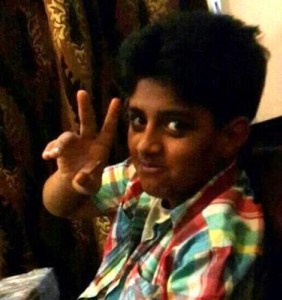
The Saudi authorities have moved the juvenile Murtaja Qureiris to the ill-reputed General Directorate Investigations (GDI, also known as al-Mabahith) prison in al-Dammam, where prisoners are taken to be tortured and ill-treated. This move on 25 May came during the month of Ramadan when the authorities typically pardon and release prisoners, andafter the authoritieshad stated that they will be releasing the 16 year-old Qureiris (born on 24 October 2000).
Murtaja Qureiris has spent close to 2 years and 8 months in the Dammam juvenile detention center (Dar al-Mulahaza) without a formal charge or trial since his arbitrary arrest on 20 September 2014.On that day, the 13 year-old was crossing the King Fahd Bridge connecting Saudi Arabia to Bahrain with his parents when he was stopped and arbitrarily arrested without a warrant. Being arrested at 13 makes him the youngest known political prisoner in Saudi Arabia.
In A/HRC/WGAD/2016/52 issued on 20 January 2017, the United Nations Working Group on Arbitrary Detention found that Murtaja Qureiris detention is arbitrary and “in contravention of articles 10, 11, 19 and 20 of the Universal Declaration of Human Rights.” It further requested the Saudi authorities “to release the minorimmediately and to accord to him an enforceable right to compensation in accordance with article 8 of the UniversalDeclaration of Human Rights.”
The Working Group on Arbitrary Detention further added that the Saudi authorities have ignored its communications on Qureiris and have not responded to them since 20 September 2016. This is despite the fact that Saudi Arabia is a four-time member of the United Nations Human Rights Council and is expected to uphold the highest standards of human rights particularly through cooperation with the Council and United Nations’ human rights bodies and mechanisms. This clearly demonstrates Saudi Arabia’s shameful human rights record at a time when it constantly and publicly claims the opposite, including during the 34th Session of the Human Rights Council in February 2017 when its representatives claimed that Saudi Arabia fully and “effectively” cooperates with United Nations agencies and mechanisms in human rights.
According to the Working Group’s information, Qureiris was interrogated a number of times without his lawyer or legal representative. He was held in solitary confinement for a month and was tortured and ill treated to force him to confess. Furthermore, his inappropriate detention conditions have caused him health problems. He was accused of, among other things, participating in peaceful demonstrations and in the funeral of protestors killed by the authorities.
Instead of responding to the Working Group and its calls to release Qureiris and provide him with appropriate compensation, the Saudi authorities have chosen to move Qureiris to the notorious al-Dammam Mabahith prison where he is at risk of further torture and ill-treatment, at a time when he remains a juvenile. All of this in clear violation of Saudi Arabia’s obligations under international law, and in particular the Convention on the Rights of the Child and the Convention Against Torture, both of which Saudi Arabia has signed and is expected to uphold.
The European Saudi Organization for Human Rights has documented numerous cases of juveniles such as Murtaja Qureiris whom the authorities have arbitrarily detained and tortured since the 2011 protests in the Eastern Province. According to available information, there are more than 80 such cases.
ESOHR emphasizes the need of the Saudi authorities to deal positively with the calls and recommendations of the United Nations Working Group, and for the immediate and unconditional release of Murtaja Qureiris and all other juvenile political prisoners, seven of whom face execution.
The organization is also concerned that moving Qureiris to the Mabahith prison will lead to forcing him to sign confessions that would later be used to convict him. This concern arises from a pattern of similar cases where detainees, including juveniles, have been tortured and forced into signing confessions that were later used to convict them of terrorism crimes and to sentence them to death.
